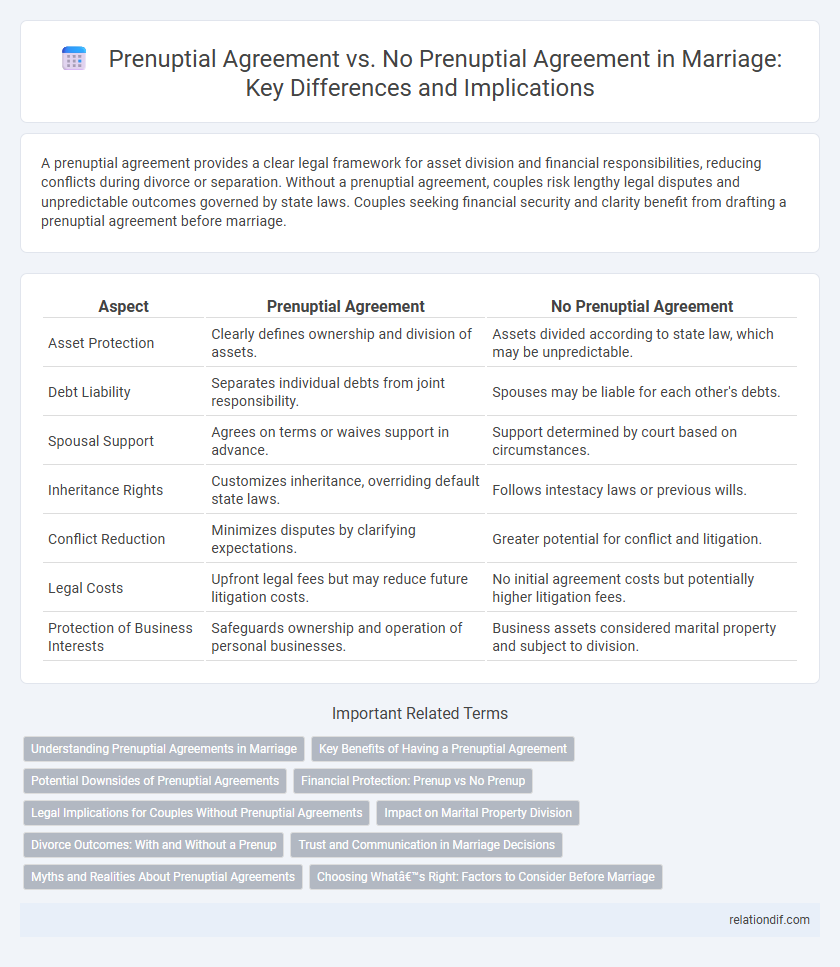A prenuptial agreement provides a clear legal framework for asset division and financial responsibilities, reducing conflicts during divorce or separation. Without a prenuptial agreement, couples risk lengthy legal disputes and unpredictable outcomes governed by state laws. Couples seeking financial security and clarity benefit from drafting a prenuptial agreement before marriage.
Table of Comparison
| Aspect | Prenuptial Agreement | No Prenuptial Agreement |
|---|---|---|
| Asset Protection | Clearly defines ownership and division of assets. | Assets divided according to state law, which may be unpredictable. |
| Debt Liability | Separates individual debts from joint responsibility. | Spouses may be liable for each other's debts. |
| Spousal Support | Agrees on terms or waives support in advance. | Support determined by court based on circumstances. |
| Inheritance Rights | Customizes inheritance, overriding default state laws. | Follows intestacy laws or previous wills. |
| Conflict Reduction | Minimizes disputes by clarifying expectations. | Greater potential for conflict and litigation. |
| Legal Costs | Upfront legal fees but may reduce future litigation costs. | No initial agreement costs but potentially higher litigation fees. |
| Protection of Business Interests | Safeguards ownership and operation of personal businesses. | Business assets considered marital property and subject to division. |
Understanding Prenuptial Agreements in Marriage
Prenuptial agreements provide a clear legal framework for asset division and financial responsibilities in marriage, protecting both parties and preventing potential disputes. Without a prenuptial agreement, couples rely on default state laws, which may not align with their individual preferences or financial situations. Understanding prenuptial agreements helps couples make informed decisions about property rights, debt allocation, and spousal support, ensuring transparency and stability throughout the marriage.
Key Benefits of Having a Prenuptial Agreement
A prenuptial agreement provides clear financial boundaries by defining asset ownership and debt responsibility before marriage, minimizing potential disputes. It ensures protection of individual property and inheritance rights, which can be crucial in blended families or second marriages. Having a prenuptial agreement also facilitates a smoother, less costly divorce process by pre-establishing terms, reducing emotional and legal complexities.
Potential Downsides of Prenuptial Agreements
Prenuptial agreements can create a sense of mistrust between partners, potentially undermining emotional intimacy and communication. They might also lead to unfair financial outcomes if circumstances change drastically, as prenups often do not account for future developments like career shifts or children. Courts sometimes scrutinize these agreements closely, risking portions being invalidated if considered unconscionable or signed under duress.
Financial Protection: Prenup vs No Prenup
A prenuptial agreement provides clear financial protection by outlining asset division and debt responsibility before marriage, reducing conflicts during divorce or separation. Without a prenup, state laws dictate asset distribution, often leading to unpredictable and costly legal disputes. Couples without prenuptial agreements risk losing business interests, inheritances, or separate property without guaranteed protection.
Legal Implications for Couples Without Prenuptial Agreements
Couples without prenuptial agreements face default state laws governing asset division and spousal support during divorce, which may not reflect individual intentions or financial contributions. Courts often consider factors like length of marriage, income disparity, and custody arrangements, potentially leading to prolonged litigation and unpredictable outcomes. Lack of a prenuptial agreement can increase financial risks, causing emotional strain and reduced clarity in property rights and debt responsibilities.
Impact on Marital Property Division
A prenuptial agreement clearly defines the division of marital property, reducing disputes and legal costs in the event of divorce. Without a prenuptial agreement, courts typically apply state laws to divide assets, which can lead to unpredictable and possibly contentious outcomes. This legal framework impacts not only asset protection but also influences financial planning and spousal support decisions during marriage dissolution.
Divorce Outcomes: With and Without a Prenup
Prenuptial agreements provide clear guidelines for asset division, reducing disputes and legal costs during divorce proceedings. Without a prenup, couples face state laws that may lead to prolonged litigation and unpredictable financial outcomes. Studies show couples with prenups experience faster settlements and greater financial clarity post-divorce.
Trust and Communication in Marriage Decisions
Prenuptial agreements establish clear expectations and financial boundaries, fostering transparent communication and reinforcing trust between partners before marriage. Without a prenuptial agreement, couples may encounter misunderstandings or conflicts over assets, potentially undermining trust and complicating decision-making during challenging times. Prioritizing open dialogue and mutual understanding strengthens relationship resilience, regardless of the presence of a formal agreement.
Myths and Realities About Prenuptial Agreements
Prenuptial agreements often face myths such as implying distrust or predicting divorce, while the reality is they provide clear financial boundaries and protect individual assets during marriage. Without a prenuptial agreement, couples risk costly legal battles and uncertain asset distribution in case of divorce or death. Legally sound prenups can safeguard both parties' interests and promote transparency, debunking misconceptions about their negative impact on relationships.
Choosing What’s Right: Factors to Consider Before Marriage
Evaluating the benefits of a prenuptial agreement involves assessing financial transparency, asset protection, and potential future conflicts, which can provide clarity and security for both partners. Couples without a prenuptial agreement may face complex legal challenges during divorce or separation, especially when significant assets or debts are involved. Considering factors such as individual financial goals, asset division preferences, and the presence of children from previous relationships helps in making an informed decision before marriage.
Prenuptial agreement vs No prenuptial agreement Infographic

 relationdif.com
relationdif.com